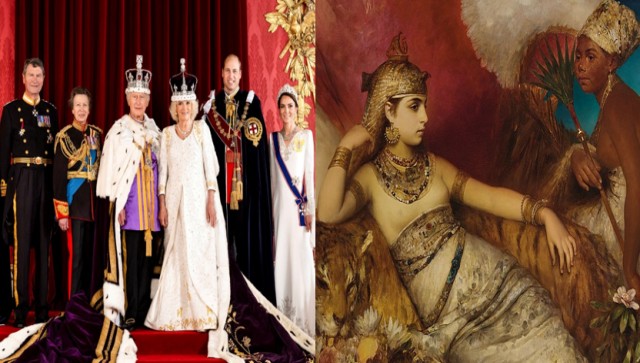Two recent events illustrate a very peculiar dilemma facing the west. The first is a comment by a black actress who plays an aristocrat in the hit series Bridgerton. She commented that the line-up on the balcony after the coronation of King Charles and Queen Camilla was “terribly white” spurring a record number of racism complaints to Britain’s TV watch-dog. The second is the selection of a black actress to play the role of Cleopatra in another new web series.
In the first case, the comment of the actress—on a TV panel covering the coronation—even drew an approving nod from a co-panellist who is a royal biographer. The illogicality of the statement clearly did not strike the other person, just the political correctness of it. Were the white people on the palace balcony—anachronistic as they looked in their gaudy raiment—duty-bound to find their life partners according to the ‘diversity’ zeitgeist rather than their hearts?
Clearly the allusion was to the absence of Prince Harry and his wife Meghan—who, as has been cited all too often, is of “mixed race—from the balcony appearance. But the reason for the absence was not race at all. Besides, was their choice of each other a matter of fashion or passion? It could not possibly be the former; so why should the race of a prospective spouse for anyone (including royals) be a matter of concern if they happen to be of the same race?
The second case is even more curious. The new web series portraying Cleopatra, the Ptolemaic queen of Egypt, as Black is not an artistic move like the Royal Shakespeare Company’s 2023 production of Julius Caesar having Brutus played by a black woman. It is meant to be an assertion of “fact” and part of a political movement to “reclaim” history and historical figures for the race, especially female ones. It’s a commendable purpose but uses questionable means.
Quick Reads
View AllThe Ptolemy dynasty was founded in 305 BC by the Macedonian Ptolemy I Soter, a general and friend of Alexander the Great, and Cleopatra VII who died in 30 BC was its last monarch. He was obviously of Greek origin as indeed were his successors—who intermarried with siblings and other royal Greeks. Just because their kingdom was in Egypt did not make them of native African descent. Indeed, even the name Cleopatra is Greek, meaning ‘beloved of her father’.
But Jada Pinkett-Smith, the producer of Queen Cleopatra justified what is being called ‘blackwashing’ thus: “We don’t often get to see or hear stories about black queens, and that was really important for me, as well as for my daughter, and just for my community to be able to know those stories because there are tons of them!” There are indeed many black—indeed non-white—queens. India too, is rediscovering her many forgotten Veeranganas but not by twisting facts.
A similar blackwashing—for a similar ‘reclamation’ effort—is being done to Queen Charlotte, the wife of Britain’s King George III, who was the subject of much gossip for her alleged black ancestry in the 18th century. The reasons offered have been distinctly feeble, including supposedly tell-tale facial features gleaned from just one of many portraits painted of her, but enough to prompt a new (US) web series on her now, with her being played by a black actress.
The intentions of both Queen Cleopatra and Queen Charlotte are very different from the series Bridgerton—the colour-agnostic portrayal of Regency era life in Britain. It does not assert that the aristocracy had black members but demonstrates that stories need not be told only through actors of one race. Hence there are Indians in that mix too. Nor is it the RSC’s case that Brutus was a black female but rather that his traits and actions should not be seen as gender-specific.
But asserting that Cleopatra and Charlotte were actually black—and looked it—is a willful distortion of history to pander to a particular section of society. On the contrary, it pushes a false narrative that actually turns energies away from the important task of identifying and bringing to the forefront the actual black queens forgotten or overlooked by historians. Besides Egypt, the African continent has had many great empires—how many of their queens have been “found”?
Nigerians, for instance, are proud of a feisty 16th queen named Amina of Zaria, who ruled for 34 years. Her exploits live on mainly through folk histories and accounts of foreigners. The similarity to our own 16th century queen Durgawati—who also lives on as a legend among the Gonds—is striking. But Durgawati finally became the focus of solid scholarly study; overlooked African queens like Amina deserve the same serious inquiry, not fickle Hollywood dalliances.
History and reality often become too unfashionable for some tastes. So an effort is on to change or gloss over facts. The west, in particular, is now leaning towards seeing every event through the prism of race, a practice made popular in and by the US. However, this leans only in one direction: blackwards—a bias that is definitely not “unconscious”. It makes political sense in the US as the “white” or European-descent population there now stands at just around 60 per cent.
The same does not apply to the UK, where an average of 87 per cent of the population is white, and when disaggregated into the four parts, it rises to above 96 per cent in Northern Ireland and above 95 per cent in Scotland and Wales. England’s London and Manchester have huge non-white populations while whites are now in a minority in Birmingham and Leicester. But the truth is, today’s Britain remains largely white, so its King, Queen and the Royal Family are pretty much in synch.
But that militates against the fashionable self-image that woke Britons have of being a very (racially) diverse society. And the argument is illogically extended to imply that all families have—or should have—mixed race links. Some now even go so far as to insinuate that white families and individuals are closet racists just because they have no mixed-race quotient. If so, then non-white families and individuals with no white links at all should also be deemed racist.
Just the fact of being white or non-white does not imbue anyone with specific characteristics or mindsets. Racism, however, is an ugly trait that some humans do possess. A feeling of superiority usually lies at the heart of it, and many races—not just white—exhibit facets of it. Its definition should not be broadened to taint everyone of a particular race simply because they happened to be born into it as is being attempted now, especially via terms like “unconscious bias”.
It is definitely a telling tale of our royally confused times that Charles, Camilla, Cleopatra and Charlotte find themselves pawns in the same game of racial roulette. Just as the British Royal Family cannot be railroaded into becoming some perceived mirror of ‘modern’ Britain, appropriating historical figures on the plea of racial re-calibration deflects from real progress on that front. Weaponising race will only harden stands and ultimately defeat the purpose.
The author is a freelance writer. Views expressed are personal.
Read all the
Latest News,
Trending News,
Cricket News,
Bollywood News,
India News and
Entertainment News here. Follow us on
Facebook,
Twitter and
Instagram.


)

)
)
)
)
)
)
)
)



